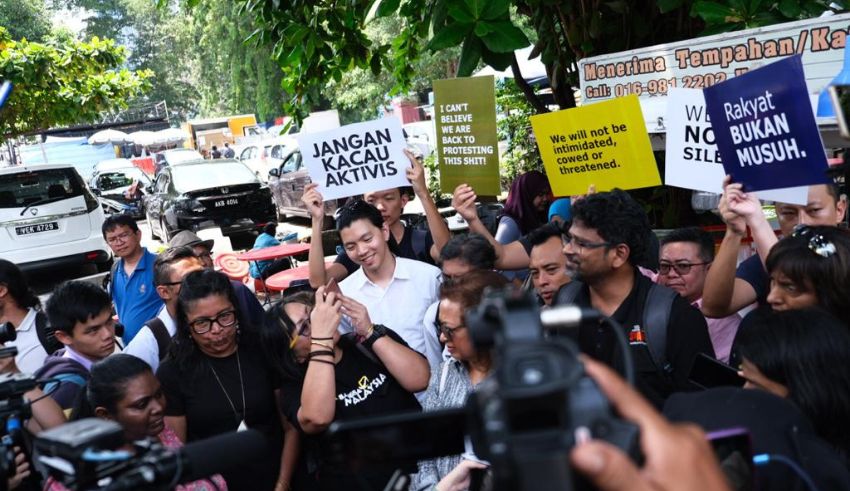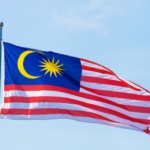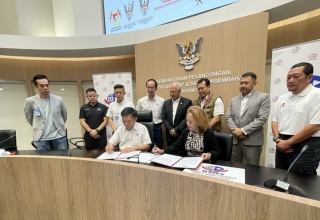
In recent days, Malaysia has witnessed a disconcerting trend as the police take increasingly hostile measures to harass protestors and curtail peaceful demonstrations.
The Perak Farmers’ Protest: A Flashpoint
On September 12, approximately 50 farmers hailing from the state of Perak, supported by Lawan Lapar (a movement focused on food security) and members of the Malaysian Socialist Party (PSM), gathered near the Malaysian Parliament to protest against land eviction policies that jeopardized their livelihoods. Their intention was to present a memorandum to the authorities. However, the police intervened, blocking their access to Parliament. Undeterred, the protestors persisted and eventually met with government representatives and parliamentarians outside the legislative body.
Subsequently, the police initiated investigations into the protest under Section 186 of the Penal Code, citing ‘obstructing civil servants from performing their duties’ as the offense. On September 18, three PSM leaders, including deputy chairperson S. Arutchelvan, treasurer Soh Sook Hwa, and youth member Ayman Hareez, were summoned for police questioning. Reports suggest that the questions posed had little relevance to the alleged offenses.
Obstruction of ‘Save Malaysia’ Protest
In another incident, police attempted to obstruct the ‘Save Malaysia’ protest organized by opposition groups on September 16. This protest aimed to express discontent regarding Deputy Prime Minister Ahmad Zahid Hamidi’s discharge not amounting to an acquittal (DNAA) in a corruption case. Despite the law only requiring organizers to provide notice, the police insisted publicly that organizers ‘apply for a permit.’ After the peaceful protest, which saw around 800 participants, the police announced their intention to question at least 25 individuals under the Peaceful Assembly Act 2012 (PAA).
This harassment follows previous instances where protesters were called in by the police for their participation in peaceful protest marches on International Women’s Rights Day and Labour Day.
Questioning the Right to Protest
“There is no basis for the police to haul up peaceful protesters for questioning. This is a clear form of harassment and creates a chilling effect for those who want to organize protests. Further, the police must stop demanding that protestors require permission from them to undertake a protest, when all that is required is a notification. Such scare tactics call into question the reformist credentials of the Anwar Ibrahim government and its commitment to respect the right to peaceful assembly,” expressed Josef Benedict, CIVICUS Asia Pacific Researcher.
Keep Reading
Flaws in the Peaceful Assembly Act
ARTICLE 19 and CIVICUS have expressed their ongoing concerns regarding the Peaceful Assembly Act (PAA), contending that it does not align with international human rights law and standards. The law imposes burdensome requirements, such as the need for detailed event and organizer information. Furthermore, organizing an assembly without prior notice can result in criminal charges and fines of up to RM10,000 ($2,134 USD).
The PAA also lacks an exception for spontaneous assemblies when providing advance notice is impractical. Additionally, it criminalizes the organization of assemblies by individuals under 21 and the attendance of children at assemblies. Non-citizens are also denied the right to organize or participate in protests, a provision viewed as discriminatory.
Calls for Reform and International Scrutiny
In 2024, Malaysia’s human rights record will undergo scrutiny at the UN Human Rights Council. During the country’s last Universal Periodic Review (UPR) in 2019, the government accepted recommendations to ‘amend existing provisions that limit the freedom of expression including the Peaceful Assembly Act.’
“The police force should stop any further harassment against protest organizers and participants. The government must take steps to revise the Peaceful Assembly Act 2012 to ensure it is consistent with international law and standards. This includes allowing space for spontaneous protests and removing discriminatory provisions in the law. Ahead of Malaysia’s review at the Human Rights Council in 2024, this would signal that the government is committed to respecting and protecting the right to protest,” asserted Nalini Elumalai, Senior Malaysia Program Officer at ARTICLE 19.

























